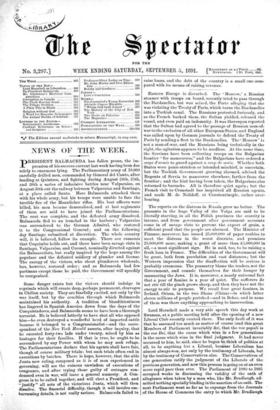Some danger exists lest the victors should indulge in reprisals
which will create deep, perhaps permanent, cleavages in Chilian society. They are fearfully excited, not only by the war itself, but by the cruelties through which Balmaceda maintained his authority. A tradition of bloodthirstiness has lingered in Spanish America down from the days of the Conquistadores, and Balmaceda seems to have been a thorough terrorist. He is believed latterly to have shot all who opposed him—he even destroyed a wonderful herd of imported cattle because it belonged to a Congressionalist —and the corre- spondent of the New York Herald asserts, after inquiry, that he executed forty-two lads under twenty, seized by him as hostages for their families. If that is true, he ought to be surrendered by any Power with whom he may seek refuge. The Parliamentarians declare that his agents shall have fair, though of course military trials; but such trials often end in executions by batches. There is hope, however, that the able Junta now ruling, composed as it is of men experienced in governing, will see the ruinous unwisdom of executions of vengeance, and after trying those guilty of outrages con- demned even in war, will issue a general amnesty. A Con- gress is to be called together, and will elect a President, and " justify" all acts of the victorious Junta, which will then dissolve. The financial difficulty, though it will involve em- barrassing details, is not really serious. Balmaceda failed to
raise loans, and the debt of the country is a small one com- pared with its means of raising revenue.


































